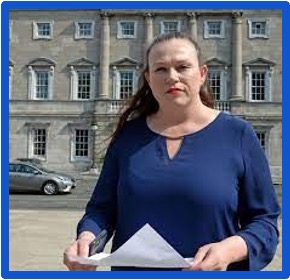Gender and Political Inequality
By Isobel Murphy
The realm of politics is a great one to enter for those considering a career involving activism, forming opinions,advocating for change, structuring their points of view, debating their point, making active changes to our world and preventing inequality, however, in many cases this path may be challenging for certain people in our society. To receive a direct insight as to the life of women in politics and gender inequality, I conducted my own investigation to visualise the struggles which are in desperate need of further outlining faced by women in politics in our year group and on a wider scale.
On a search to find out more about the life of women in politics, an opportunity arose to have a virtual meeting with TD Louise O’ Reilly and ask her some questions about her personal experience. Louise was extremely helpful and I really appreciated this chance to receive such a direct view into some of the struggles and experiences she holds as a politician.
Firstly, I asked her about her personal experience as a woman in politics. She replied that for the most part, her career as a female politician has been very positive. She mentioned that she feels very fortunate to be part of a party that is quite progressive and that is led by two female politicians. Of course for everyone involved in politics, it can be a challenging environment to be placed with, although her career has been overall very worthwhile due to her passion.
My second question revolves around the struggles Ms. O’ Reilly has been presented with through her roles, and even though her passion leads her to a career she is very passionate about, she acknowledges that at times her gender can be a component in her difficulties. She recalled a time in her career in which she had been promoted and after her boss at the time congratulated her on this success, he told her to “Be prepared to take on twice the workload for half of the recognition”. Such a statement appeared unfair but as Louise reiterated, was not at all untrue. What irritates her is being called to debate certain topics solely based on her gender identity. Louise also mentioned that a difficult part of her career was being the subject of online hate and trolling.
Lastly, I asked her if she had any advice for girls attending Loreto Balbriggan who hope to study politics in the future. One key piece of advice she had was to just go for it and never hold yourself back. It is encouraged by her to put yourself forwardand to never allow such barriers to prevent you from being involved. Louise stated that regardless of any challenges faced by women in politics it is an immensely rewarding path to take.
To finalise my results, I conducted a short survey involving 30 of my fellow Transition Year students who are currently partaking in a legal studies module and some that are studying politics for the Leaving Certificate. I wanted their own views to be included in my research. Here are the results I have received!
An overwhelming majority identifies as female, which would then give me an overview of their struggles as women in politics but also on a general level with everyone surveyed.
My second question asks whether or not those surveyed have been treated differently as a result of their gender identity. A vast majority of 73.3 % say that yes, their gender has contributed to the way that they are treated, which unfortunately does not surprise me in the slightest way. I think this result is evident that there is an issue here in relation to gender equality in our society, especially as many others would yet again agree that such numbers are not out of the ordinary.
Out of the 30 TY students that are either partaking in a legal studies module or studying politics for the Leaving Cert, a majority of 46.7% (nearly half) are unsure of whether or not they want to enter politics. 36.7% would like a career in this sector and 16.7%, a small minority would not. Due to the majority result, I feel that this indicates a lot of room for influence. If this influence is not very positive then these results could very much change, which leads me on to my next question.
I created a bar chart for this information to give you a visual as to the responses I received from this particular question asking for the respondents opinions ranging from intensity of agreement to disagreement and most results fell on the agreeance side of the spectrum even although an equal amount of people answered strongly agree and strongly disagree.
It really surprised me that so many of my respondents would be discouraged from a possible career path solely from the struggles faced by other women in politics!
To conclude, the struggles of gender inequality seen throughout politics is a very apparent issue which has been shown in my investigation. There is so much that needs to change to allow for a more equal environment not only in the political realm, but in society as a whole. I really hope that I have elucidated these issues and that in the future more can be done in regards to gender inequality and politics worldwide. Thank you!






Comments
Post a Comment